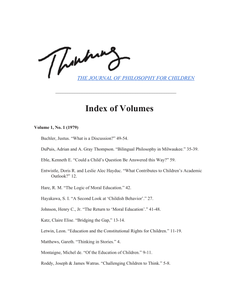Sinds mensenheugenis is de mens op zoek naar wijsheid. We zijn op zoek naar ‘wijze’ ideeën over hoe om te gaan met de dagelijkse praktijk en voor antwoorden op vragen en beslissingen die we moeten nemen. De centrale vraag is: hoe kunnen we wijsheid als concept voor management en ondernemerschap toegankelijk maken? Wat is de relevantie van wijsheid voor managers en professionals die dagelijks met problemen, uitdagingen en onzekerheden moeten omgaan? In Another State of Mind gaan de auteurs terug naar de culturele geschiedenis waar ze antwoorden vinden op de vraag: hoe wijs te handelen in relatie tot de vraagstukken van deze tijd? De inzichten in dit boek bieden handvatten om zowel in het persoonlijke, professionele en organisatieleven waarde te creëren en betekenisvol te handelen.
DOCUMENT
The journal was a forum for the work of both theorists and practitioners of philosophical practice with children, and published such work in all forms, including philosophical argument and reflection, classroom transcripts, curricula, empirical research, and reports from the field. The journal also maintained a tradition in publishing articles in the hermeneutics of childhood, a field of intersecting disciplines including cultural studies, social history, philosophy, art, literature and psychoanalysis.
DOCUMENT

Purpose To analyze differences between Western and Eastern cultures in the way they conceptualize knowledge and discuss the implications of these differences for a global intellectual capital (IC) theory and practice. Design/methodology/approach A systematic metaphor analysis of the concept of knowledge and IC is used to identify common Western conceptualizations of knowledge in IC literature. A review of philosophical and religious literature was done to identify knowledge conceptualizations in the main streams of Asian philosophy. Findings Fundamental differences were found in the way knowledge is conceptualized. In Western IC literature common metaphors for knowledge include knowledge as a thing and knowledge as capital. In Asian thought, knowledge is seen as unfolding truth based upon a unity of universe and human self and of knowledge and action. Research limitations/implications The research was performed on a limited sample of literature. More research is needed to identify how knowledge is conceptualized in the practice of doing business in Asia and to test the effects of introducing IC theories to Asian businessmen and managers. Practical implications Western conceptualizations of knowledge, embedded in terms like intellectual capital and knowledge management, can not be transferred to Asian business without considering the local view on knowledge. Asian conceptualizations of knowledge should play an important role in the further development of a knowledge-based theory and practice of the firm. Originality/value The paper is the first to explore differences in knowledge conceptualizations by analyzing the underlying metaphors that are used in Western IC literature and Asian philosophy.
DOCUMENT
